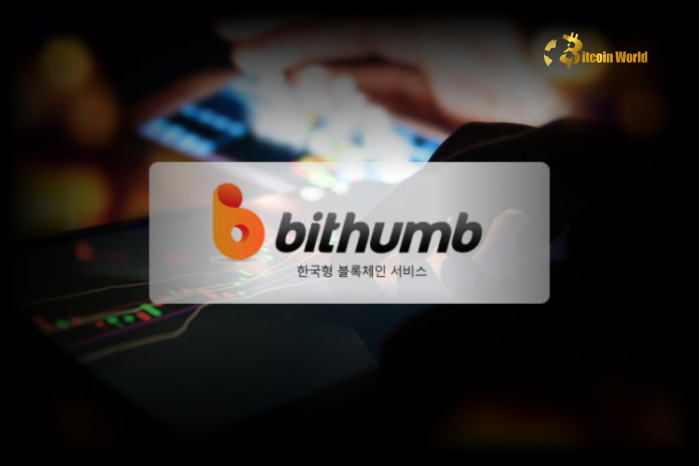Cryptocurrency traders on Bithumb, South Korea’s second-largest exchange, experienced a jolt of surprise recently. Imagine depositing funds to trade a new, promising token, only to discover you’ve been slapped with fees 100 times higher than expected! This is exactly what happened with the newly listed IP token, the asset of the layer-1 network Story (IP), due to a system glitch at Bithumb. Let’s dive into the details of this unexpected event and what it means for users and the exchange.
Bithumb’s System Glitch: A Costly Error
Bithumb, a prominent player in the global cryptocurrency exchange landscape, faced an embarrassing incident involving its fee structure. According to a report by Chosun Biz, a technical malfunction led to users being charged exorbitant fees when trading the newly listed IP token. This wasn’t a minor miscalculation; it was a massive 100-fold increase from the standard fee rate. This error quickly inflated transaction costs for anyone venturing into the new token’s market on Bithumb.
The numbers involved were significant:
- Total IP-related Trades: 51 billion won ($35.34 million)
- Fees Collected (erroneously): 4.1 billion won ($2.84 million)
- Fee Multiplier: 100x the usual rate
Such a substantial amount of overcharged fees within a short period highlights the potential impact of even brief technical errors in high-volume trading environments. For users, this meant a significant, albeit temporary, dent in their trading capital.
How Did the Bithumb Fee Fiasco Unfold?
While the exact technical details of the system glitch remain undisclosed, Bithumb attributed the issue to a technical error within their trading platform. The error specifically targeted the newly listed IP token, suggesting it might have been related to the configuration settings for this particular asset.
Here’s a simplified breakdown of the likely scenario:
- Listing of IP Token: Bithumb listed the IP token for trading on its platform.
- Configuration Error: During the setup process for the IP token’s trading parameters, a technical glitch caused the fee calculation to be incorrectly set at 100 times the intended rate.
- User Transactions: Users began trading the newly listed IP token, unknowingly incurring massively inflated fees with each transaction.
- Detection and Correction: Bithumb’s system or user reports flagged the anomaly, leading to the discovery of the system glitch.
- Refunds Issued: Bithumb swiftly acknowledged the error and initiated refunds for all affected users, returning the overcharged fees.
This incident underscores the critical importance of robust testing and quality assurance processes when implementing new features or listing new cryptocurrencies on exchanges. Even a seemingly small configuration mistake can lead to significant financial repercussions for users and reputational damage for the platform.
Impact and Aftermath: Lessons Learned from the Bithumb Incident
While Bithumb acted promptly to rectify the situation by refunding the overcharged fees, the incident raises several important points for both users and cryptocurrency exchanges:
- User Trust and Confidence: Such incidents, even when resolved quickly, can erode user trust in the platform. Users rely on exchanges to be accurate and reliable, especially when it comes to financial transactions.
- Importance of Transparency: Bithumb’s swift acknowledgment and communication about the error were crucial in mitigating potential damage. Transparency in such situations is key to maintaining user confidence.
- System Redundancy and Error Detection: Exchanges need to invest in robust systems with built-in error detection mechanisms to prevent such glitches from occurring or to quickly identify and resolve them. Regular audits and stress testing are essential.
- User Vigilance: While users aren’t expected to audit exchange fee structures constantly, this incident serves as a reminder to always double-check transaction details, especially when trading newly listed or less familiar tokens.
- Regulatory Scrutiny: Incidents like these might attract increased scrutiny from regulatory bodies, emphasizing the need for exchanges to adhere to the highest operational standards.
What Does This Mean for IP Token and Story (IP)?
The IP token, being newly listed, found itself unintentionally in the spotlight due to this Bithumb system glitch. While the error was unrelated to the token itself or the Story (IP) network, it could have indirectly impacted initial trading sentiment.
Here’s how:
- Initial Price Volatility: The confusion and potential negative sentiment surrounding the fee issue could have contributed to price volatility in the IP token’s early trading days on Bithumb.
- User Hesitation: Some users might become hesitant to trade the IP token on Bithumb immediately after such an incident, even after the fees were corrected.
- Long-Term Impact (Likely Minimal): Given Bithumb’s quick response and the nature of the error being a platform glitch rather than an issue with the token itself, the long-term impact on IP token’s perception is likely to be minimal.
Ultimately, the focus should remain on the fundamentals of the Story (IP) network and the utility of the IP token itself, rather than being overshadowed by this isolated exchange-specific incident.
Actionable Insights for Crypto Traders
While the Bithumb overcharged fees incident was quickly resolved, it provides valuable lessons for cryptocurrency traders:
- Always Review Transaction Details: Before confirming any crypto transaction, especially on less familiar platforms or with newly listed tokens, carefully review all details, including fees.
- Start with Small Trades: When trading new or volatile cryptocurrencies, consider starting with smaller trades to test the waters and understand the platform’s dynamics and fee structure.
- Stay Informed About Exchange Policies: Familiarize yourself with the fee structure and operational policies of the cryptocurrency exchange you are using. Monitor announcements and updates from the exchange.
- Utilize Reputable Exchanges: While incidents can happen on any platform, choosing reputable and well-established exchanges with a track record of security and customer support can minimize risks.
- Diversify Exchange Usage: Consider using multiple exchanges instead of relying solely on one. This diversification can mitigate risks associated with platform-specific issues.
Conclusion: Navigating the Cryptocurrency Landscape
The Bithumb overcharged fees episode serves as a stark reminder of the inherent complexities and occasional pitfalls within the rapidly evolving cryptocurrency market. While technological glitches are sometimes unavoidable, the speed and effectiveness of the response are paramount. Bithumb’s prompt action in acknowledging the error and refunding users is commendable and helps to mitigate the negative impact. For cryptocurrency users, vigilance, informed trading practices, and choosing reliable platforms remain crucial for a safer and more successful trading journey. As the crypto space matures, continuous improvements in platform reliability and transparency are essential to foster greater trust and broader adoption.
To learn more about the latest cryptocurrency exchange trends, explore our article on key developments shaping cryptocurrency institutional adoption.






